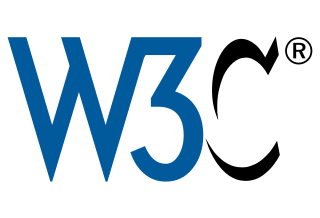
Hypertext Markup Language (HTML) is the standard markup language for documents designed to be displayed in a web browser. It defines the content and structure of web content. It is often assisted by technologies such as Cascading Style Sheets (CSS) and scripting languages such as JavaScript, a programming language.

The World Wide Web is an information system that enables content sharing over the Internet through user-friendly ways meant to appeal to users beyond IT specialists and hobbyists. It allows documents and other web resources to be accessed over the Internet according to specific rules of the Hypertext Transfer Protocol (HTTP).

The World Wide Web Consortium (W3C) is the main international standards organization for the World Wide Web. Founded in 1994 and led by Tim Berners-Lee, the consortium is made up of member organizations that maintain full-time staff working together in the development of standards for the World Wide Web. As of 5 March 2023, W3C had 462 members. W3C also engages in education and outreach, develops software and serves as an open forum for discussion about the Web.
An open standard is a standard that is openly accessible and usable by anyone. It is also a common prerequisite that open standards use an open license that provides for extensibility. Typically, anybody can participate in their development due to their inherently open nature. There is no single definition, and interpretations vary with usage. Examples of open standards include the GSM, 4G, and 5G standards that allow most modern mobile phones to work world-wide.

HTML5 is a markup language used for structuring and presenting hypertext documents on the World Wide Web. It was the fifth and final major HTML version that is now a retired World Wide Web Consortium (W3C) recommendation. The current specification is known as the HTML Living Standard. It is maintained by the Web Hypertext Application Technology Working Group (WHATWG), a consortium of the major browser vendors.
A distributed social network is a network wherein all participating social networking services can communicate with each other through a unified communication protocol. Users that reside on a compatible service can interact with any user from any compatible service without having to log on to the origin's website. From a societal perspective, one may compare this concept to that of social media being a public utility. Federated social networks contrast with social network aggregation services, which are used to manage accounts and activities across multiple discrete social networks that cannot communicate with each other. A popular example for a federated social network is the fediverse, with more niche examples such as IndieWeb complementing the network.
Extensible HyperText Markup Language (XHTML) is part of the family of XML markup languages which mirrors or extends versions of the widely used HyperText Markup Language (HTML), the language in which Web pages are formulated.

Cascading Style Sheets (CSS) is a style sheet language used for specifying the presentation and styling of a document written in a markup language such as HTML or XML. CSS is a cornerstone technology of the World Wide Web, alongside HTML and JavaScript.
The W3C Geolocation API is an effort by the World Wide Web Consortium (W3C) to standardize an interface to retrieve the geographical location information for a client-side device. It defines a set of objects, ECMAScript standard compliant, that executing in the client application give the client's device location through the consulting of Location Information Servers, which are transparent for the application programming interface (API). The most common sources of location information are IP address, Wi-Fi and Bluetooth MAC address, radio-frequency identification (RFID), Wi-Fi connection location, or device Global Positioning System (GPS) and GSM/CDMA cell IDs. The location is returned with a given accuracy depending on the best location information source available.
WebRTC is a free and open-source project providing web browsers and mobile applications with real-time communication (RTC) via application programming interfaces (APIs). It allows audio and video communication and streaming to work inside web pages by allowing direct peer-to-peer communication, eliminating the need to install plugins or download native apps.
WebID is a method for internet services and members to know who they are communicating with. The WebID specifications define a set of editor's drafts to prepare the process of standardization for identity, identification and authentication on HTTP-based networks. WebID-based protocols offer a new way to log into internet services. Instead of using a password, for example, the member refers to another web address which can vouch for it. WebID is not a specific service or product.
Security Assertion Markup Language (SAML) is a set of specifications that encompasses the XML-format for security tokens containing assertions to pass information about a user and protocols and profiles to implement authentication and authorization scenarios. This article has a focus on software and services in the category of identity management infrastructure, which enable building Web-SSO solutions using the SAML protocol in an interoperable fashion. Software and services that are only SAML-enabled do not go here.

Kantara Initiative, Inc. is a non-profit trade association that works to develop standards for identity and personal data management. It focuses on improving the trustworthy use of identity and personal data in digital identity management and data privacy.

The FIDOAlliance is an open industry association launched in February 2013 whose stated mission is to develop and promote authentication standards that "help reduce the world’s over-reliance on passwords". FIDO addresses the lack of interoperability among devices that use strong authentication and reduces the problems users face creating and remembering multiple usernames and passwords.
Encrypted Media Extensions (EME) is a W3C specification for providing a communication channel between web browsers and the Content Decryption Module (CDM) software which implements digital rights management (DRM). This allows the use of HTML video to play back DRM-wrapped content such as streaming video services without the use of heavy third-party media plugins like Adobe Flash or Microsoft Silverlight. The use of a third-party key management system may be required, depending on whether the publisher chooses to scramble the keys.

The Fediverse is a collection of social networking services that can communicate with each other using a common protocol. Users of different websites can send and receive status updates, multimedia files and other data across the network. The term Fediverse is a portmanteau of "federation" and "universe".
Micro.blog is a microblogging and social networking service created by Manton Reece. It is the first large multi-user social media service to support the Webmention and Micropub standards published by the World Wide Web Consortium, and is part of the Fediverse, supporting ActivityPub.

ActivityPub is a protocol and open standard for decentralized social networking. It provides a client-to-server (C2S) API for creating and modifying content, as well as a federated server-to-server (S2S) protocol for delivering notifications and content to other servers. ActivityPub has become the main standard used in the fediverse, a popular network used for social networking that consists of software such as Mastodon, Pixelfed and PeerTube.
Web Authentication (WebAuthn) is a web standard published by the World Wide Web Consortium (W3C). WebAuthn is a core component of the FIDO2 Project under the guidance of the FIDO Alliance. The goal of the project is to standardize an interface for authenticating users to web-based applications and services using public-key cryptography. WebAuthn credentials that are available across multiple devices are commonly referred to as passkeys.

Verifiable credentials (VCs) are digital credentials which follow the relevant World Wide Web Consortium open standards. They can represent information found in physical credentials, such as a passport or license, as well as new things that have no physical equivalent, such as ownership of a bank account. They have numerous advantages over physical credentials, most notably that they're digitally signed, which makes them tamper-resistant and instantaneously verifiable.







